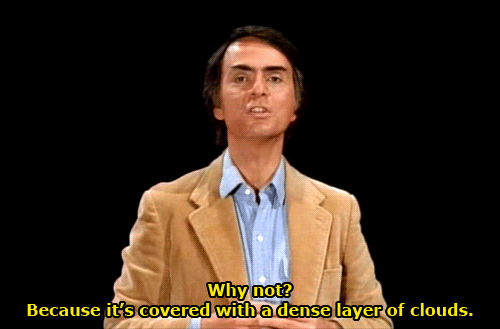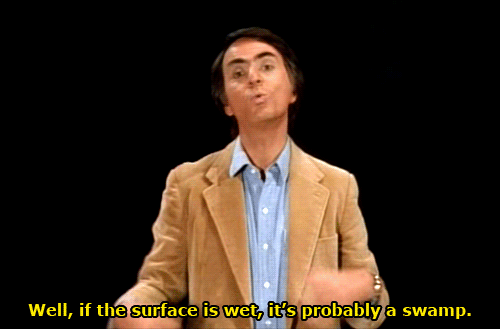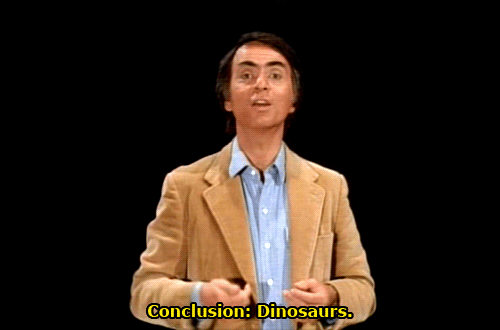Here, I'll let Cosmologist Sean Carroll explain...
I'll wait till cosmetologist LaTeisha explains it

Follow along with the video below to see how to install our site as a web app on your home screen.
Note: This feature may not be available in some browsers.
Here, I'll let Cosmologist Sean Carroll explain...
I missed the part that tells me where to find some Retumbo in the universe.
... Infinity cannot be quantified as it is ...well, infinite.
I might be repeating something Dogtown said, but all matter is mostly just empty space. The clothes you are wearing, assuming you're wearing any, has far more empty space than it does matter (instead of the word matter, we might just say clothing particles). And that space is quantifiable.
Once again, here we have a science post that rapidly devolves into a debate over the validity of science in general. What's the bizarre correlation between the shooting community and its hostility to science? You'd think that a group of guys who rely so heavily on applied ballistic and mechanical sciences would support the process instead of be so highly opinionated of it?
I appreciate the efforts to educate me on all of this, but I'm Christopher Columbus's dimwitted farmer cousin.
Wait, what?
Do you realize there's a difference between the colloquial use of the word "theory" and the scientific use? In science, a theory is a framework or model that explains observational data and experimentation. It's completely different than a scientific law - there is no hierarchy between the two where one is elevated over the other. Scientific theories don't get proven into laws. And theoretical work is a legitimate form of science. That's specifically why there is such a thing as Theoretical Physicist and Experimental Physicist. How are the three key areas I listed in the original post not major breakthroughs in Physics and Cosmology?
OK, I get it; go against the popular viewpoint, get labeled Luddite. Or worse....










If there was more mass tucked away in black holes then it would reveal itself through gravitational lensing and how it affected the orbits of nearby matter (gas, stars, etc).
To say otherwise would contradict so many well understood facets of astrophysics, that none of our probes we sent to other planets, asteroids and comets would have been successful.

OK, I get it; go against the popular viewpoint, get labeled Luddite. Or worse.
On supermassive black holes we find at the center of galaxies, our best understanding is that they are the result of mergers, which is something we not only see in various stages of happening, but also simulation work has revealed it to be a very plausible explanation. Yes, I know that doesn't PROVE it, but there is no 100% proof in science, there is only levels of validity and the idea with the most evidence, direct or indirect, is more valid than the one with none.
Day's been great. Boys played at the park, went swimming, chick-fil-a then off to the range with a buddy and his dad.
Had a great WA Syrah with some salami and Roquefort.
Read your own posts and you tell me who has the jeering hostility.
There's no rational benchmark that says truth must be simple. So what if you can't explain it to a college grad. Perhaps it's your failing rather than the content. There are many brilliant liberal arts graduates who are befuddled by the workings of a toaster and I'm sure there are science grads who get stumped by Shakespeare's allusions. To your thought both are 'Kool-aid'... Falsehoods cooked up to justify a stipend of funding.
Greg, it's very difficult to read your post because it comes across as very confused.

[MENTION=20741]500grains[/MENTION], you could not be further from the truth. As someone who has spent countless sleepless nights over the course of years doing what I could do to master what little I did in the sciences I am of the mind to tell you to fuck off and leave it at that. But in the hopes that you have the sort of open mind a fan of the sciences might have I will explain myself, and do so within the context of this thread. I can't speak for anyone else other than to say others certainly have had similar experiences. And the many lines between faith and fact, and ignorance and understanding are so broad and varied that we have large sections of the library filled with the thoughts of some pretty smart people so I will leave you to that on your own.Science does not require belief. Non-belief and skepticism and fine. But ignorance is a sorry basis for disbelief.
Moses,
Smart people can make a point in fewer words.
Science does not require belief. Non-belief and skepticism and fine. But ignorance is a sorry basis for disbelief.
[MENTION=20741]500grains[/MENTION]you could not be further from the truth.
Science REQUIRES belief. Non-belief and skepticism ARE NOT fine. And ignorance is a GOOD basis for disbelief.
I posted:
You responded:
That means:
It seems you went out into la-la land Moses.
And I skipped the rest of your post because it did not look like interesting info about guns or physics.
Moses,
Smart people can make a point in fewer words.
You got that right!
Science does not require belief. Non-belief and skepticism and fine. But ignorance is a sorry basis for disbelief.
You people are ruining a long nurtured knuckle dragging redneck cacogenic stereotype. It will not be so easy for the community to get that back once we are exposed.
